Data – a success factor for companies
The newly founded Competence Center at the Leibniz Joint Lab Data Science & Open Knowledge supports companies in Lower Saxony in terms of secure data exchange along the value chain
by Alexandra Garatzogianni, Sandra Niemeyer, Andreas Kembügler, Thorsten Hülsmann
This article has also been published in the current issue of b.i.t. online, issue 4/2019 (in German only).
Never before was the world so networked as it is today. Digitalization offers countless opportunities for new business models. Data as a strategic resource can be decisive for the success of companies. Reliable and secure access to and handling of data is therefore of crucial importance for the future of our economy and society.
Key technology for innovative applications in Artificial Intelligence (AI)
Why are data sovereignty and data-based business models important for the competitiveness of the German and international economy? How does secure data exchange between companies generate new value creation potential? And how can secure data exchange between companies be made possible? The International Data Space Association (IDSA) provides answers to these and other questions: Together with its members from industry and research, it is developing a secure, trustworthy architecture for data exchange along cross-company value chains. It thus creates a basis for digitization and more efficient design of industrial production and business processes. It opens up potential for new value creation scenarios.
In particular the non-profit association IDSA would like to establish a standard, namely a de-facto standard for a safe data place and a sovereign data transfer, which will be used by enterprises across industries and countries. The goal is to establish globally valid rules and guidelines for data sovereignty: Who is allowed to do what with which data in which context?
„Companies in Germany and Europe need a strategic tool with which they can securely exchange and combine their data in value creation networks. This is the fundamental prerequisite for innovation and the basis for modern business models,“ says Prof. Dr. Boris Otto, Deputy Chairman of the Executive Board of IDSA and Managing Director of the Fraunhofer Institute for Software and Systems Engineering ISST.
Virtual space for data exchange
The goal: A network of reliable, securely exchangeable data that contributes to more efficient value creation in all domains of the economic activity. In the future, companies will be able to exchange their data in a virtual data space and thus make it usable for other companies. The sovereignty over one’s own data has to be respected and safeguarded; the trustworthy cooperation and integration as well as security have to be guaranteed. „The International Data Spaces make it easier for companies to exploit the potential of digitization for their business models without giving up control over their data,“ explains Otto.
This can be illustrated very clearly by the use cases from the IDS.
However, there is still a long way to accomplish the open data space. One step in this direction is the establishment of the IDS Competence Centre in Lower Saxony at the Leibniz Joint Lab Data Science & Open Knowledge of the L3S Research Center of Leibniz Universität Hannover (LUH) and the TIB – Leibniz Information Centre for Science and Technology. Both entities contribute their knowledge and their extensive research and technology competencies in the domain of data science, which they want to transfer to interested companies and cooperation partners. The official founding event, entitled „International Data Spaces (IDS) for Industry 4.0“, took place at the TIB on 19 June 2019. It was part of the TIB and L3S „Research Meets Business“ series of events aimed at helping companies implement digitization via research and innovation.
„It is great that a regional competence center of the International Data Space Association has been founded at the L3S Research Center in Hannover“, explained Dr. Sabine Johannsen, State Secretary in the Ministry of Science and Culture of Lower Saxony, at the official founding event at the end of June. At the moment, a lot is happening in Lower Saxony to shape digitization initiatives. Johannsen continued that it is important for science and industry to exchange ideas and inventions, because this is the only way to turn ideas and inventions into marketable products.
The focus of this event was the IDS and the foundation of the regional competence center: Prof. Dr. Boris Otto focused at his keynote on the „IDS as a smart data infrastructure for future AI applications“. Further presentations focused on data integration in industry 4.0 and semantic data integration in IDS, for instance the following keynotes on „Data integration in industry 4.0“ by Prof. Dr.-Ing. Berend Denkena (Institute of Manufacturing Engineering and Machine Tools, LUH), „Semantic Data Representation in IDS“ by Dr. Sebastian Tramp (eccenca GmbH) and the „EU Project Boost 4.0 (Big Data for Factories) and Semantic Data Networking for IDS“ by TIB’s Director Prof. Dr. Sören Auer. Moreover AI was an important element of this event with the lectures on „How AI changes the automotive industry“ by Dr. Michael Nolting (Head of Digital Services & Data Analysis at Volkswagen Commercial Vehicles) and „IIP-Ecosphere – a novel AI ecosystem for networking industry, SMEs and research“ by Dr. Claudia Niederée (L3S).
International, national, regional: IDSA Competence Center Lower Saxony
With the International Data Spaces becoming increasingly popular at national, European and international level, it is a direct result that IDSA’s regional competence centres and innovation hubs are currently also emerging. In the meantime, 100 member institutions from industry and research are actively involved in the IDSA. Together they are working on the further development of the IDS reference architecture and the IDS standard. In order to support the members with know-how, to advance the joint work and to exchange experiences, the IDSA establishes a close network. The nodes in this network are the IDSA competence centere. The IDSA would like to establish these centers primarily at economic and social „hot spots“. Hannover is such a hot spot: as the capital of Lower Saxony, a major city with over half a million inhabitants, and as a globally renowned location for science, industry and trade fairs.
„With the new IDSA Competence Center in Hannover, we want to help companies in Lower Saxony build on trustworthy data infrastructures to implement new business models and innovations through artificial intelligence (AI) in production and other data-driven business areas,“ says Prof. Dr. Wolfgang Nejdl, Managing Director of the L3S Research Center.
„Particularly in Lower Saxony, data exchange along the industrial value chains plays a central role and in our Joint Lab we look forward to working together with companies in the region,“ says TIB’s Director Prof. Dr. Sören Auer.
„The IDSA Competence Center in Lower Saxony constitutes an interface between industry, research and science. It aims to support the introduction of new AI technologies and business models, the digitisation and the exchange of best practices, standards and data. In this way, Lower Saxony will play an even more important role in the European and international network by ensuring the sustainability and competitiveness of the regional industry,“ says Alexandra Garatzogianni, Senior Project Manager for Research and Innovation at the TIB and the L3S Research Centre and responsible for the Lower Saxony IDSA Competence Centre.
From reference model to open data marketplace
IDSA has been developing a reference architecture for a secure data space since 2016 – for a future open data marketplace, various requirements must be met: Requirements for such a protected data space must be identified and aligned, so that data from different segments can be shared and exchanged internationally based on predefined rules and regulations. In addition, requirements for the development and operation of such a data space must be defined and recommendations for action must be provided for the companies. The IDSA currently has more than 100 members from 20 countries. These include software and system providers, large medium-sized companies such as Boehringer, Rittal, SICK or Schaeffler, groups such as Allianz, Bosch, IBM or Volkswagen, research institutions such as Fraunhofer, the Institute for Microtechnology at Braunschweig Technical University or TNO, the Dutch Organisation for Applied Natural Science Research. In the (so-called) „IDS Communities“, the members promote the application of the IDS reference architecture and the establishment of the IDS standard. There are the communities such as „Industrial“, „Logistics“ and „Medical“ as well as the SME Alliance for small and medium-sized enterprises.
With „IDS_ready“, the new seal for trustworthy data exchange, the IDS concept is now also ready for commercial use. The IDS architecture can be used by companies outside of the association. This is a big step in the way to a secure and trustful data exchange in the industry.
TIB and L3S: Support for institutions in Lower Saxony
In the IDSA Competence Centre in Lower Saxony, best practices will be exchanged, concrete use cases will be processed, user requirements will be defined and aligned for the future data marketplaces. Furthermore information events and training courses offered to interested organisations from industry, research and administration will be offered. Additionally, the IDS data architecture will be used as a basis for new AI applications such as intelligent production. Intelligent data networking in production processes involving suppliers and specialized service providers will then enable new analysis and forecasting services, for instance in terms of optimizing maintenance intervals or quality management.
In particular, TIB will support semantic data networking using vocabularies and ontologies. The close collaboration of TIB with IDSA will ensure that the data infrastructure – where possible and useful – is compatible with the IDS reference model, where ontologies are also used for semantic data networking. In concrete terms, this means that information between different companies in a value chain is not only easier to exchange, but can also be processed in a way that is comprehensible to machines and people using semantic descriptions.
As a scientific library and research institution, TIB can contribute its expertise and role as a German information centre for the digitisation of science and technology to the IDSA. The L3S contributes its expertise from digital transformation as well as data and web science. Knowledge transfer in business, policy and society is a central component of the activities of the TIB and the L3S. In this way, synergies can be formed and the IDS can be further developed. One of the first tasks of the IDSA Competence Centre is to develop training courses for regional companies and to work on specific applications. Further steps will then be taken to increasingly network relevant stakeholders, as well as data and processes so that an open data space will be created at the end which guarantees reliable and secure access to and processing of data.
Contact person:
Alexandra Garatzogianni
Senior Project Manager for Research and Innovation
TIB – Leibniz Information Centre for Science and Technology: alexandra.garatzogianni@tib.eu
Research Centre L3S: garatzogianni@l3s.de
Leibniz Joint Lab Data Science & Open Knowledge
How search be optimally conducted in large databases on the Internet, in libraries or archives? How can distributed information be better networked and information flows between organizations be smoothly organized? Scientists in the Leibniz Joint Lab Data Science & Open Knowledge of the TIB and the L3S are dealing with these and other questions on the topics of data science and open knowledge.
The aim of the Joint Lab is to research methods that make it possible to support the work of researchers in science and industry in the digital world. In addition to classical publications in document form, videos, research data, software or knowledge graphs must also increasingly be taken into account. Research areas include digital libraries, visual analytics, open science, information retrieval, web science and web archives, data mining and human-computer interaction.
The Joint Lab is headed by Prof. Dr. Sören Auer, Director of the TIB and holder of the chair „Data Science & Digital Libraries“ at Leibniz Universität Hannover. Prof. Dr. Wolfgang Nejdl, Director of the Research Center L3S, is the scientific contact person at Leibniz University.
L3S Research Center
Scientists from the L3S Research Centre at Leibniz Universität Hannover are developing methods and technologies for digital change and researching the effects of digitisation in order to derive options for action, recommendations and innovation strategies for business, politicy and society. Through research, development and consulting, the L3S and its partners contribute to the digital transformation, especially in the areas of mobility, health, production and education.
TIB – Leibniz Information Centre for Science and Technology
TIB is the German National Library for Technology, Architecture, Chemistry, Informatics, Mathematics and Physics, providing literature and information in these domains to the national and international research and industry. It is the world’s largest specialist library in its fields and has an excellent stock of fundamental and highly specialised technical and scientific literature.
TIB is constantly expanding its role as a German information centre for the digitisation of science and technology. At www.tib.eu it provides scientific content, digital services and methodological expertise for specialist and research communities in order to support the various phases of scientific work. As a research library, TIB conducts applied research and development to generate new services and optimize existing ones. The focus is on data science, non-textual materials, open science and visual analytics.
Leitung Wissens- und Technologietransfer, Koordinatorin von EU-Projekten // Head of Knowledge and technology transfer, Coordinator of EU Projects
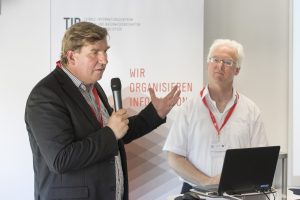
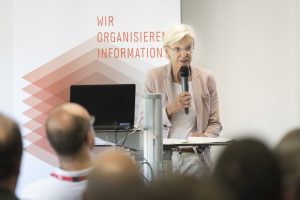
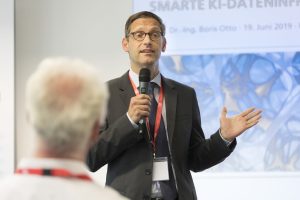
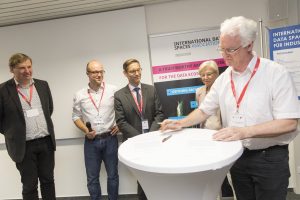


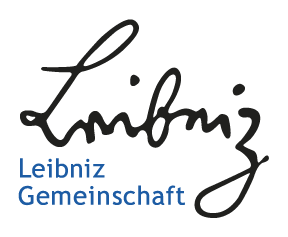
Eine Antwort auf “Data – a success factor for companies”